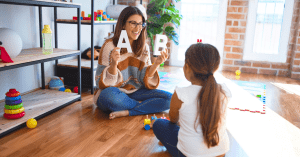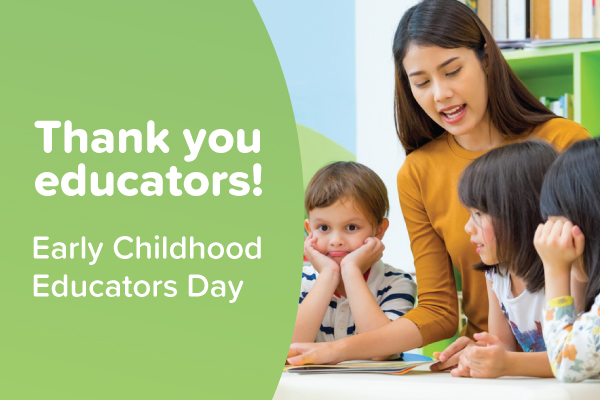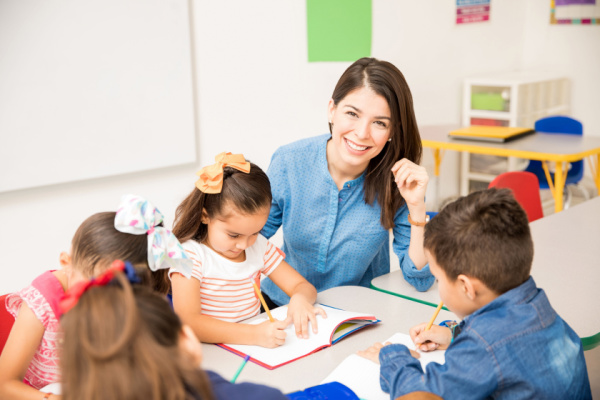You like spending time with children, you are always happy when you’re around them and you enjoy teaching new things — a career in early childhood education feels like it would be a perfect fit. But what else does it mean to be an early childhood educator?
As well as having fun with children, a role as an educator is an important one. As an early childhood educator, you provide care and educational experiences for children during their most critical developmental period.
From birth until age five, the brain undergoes a phenomenal amount of wiring and growth, and a high-quality early childhood education experience can have a lasting impact on a child’s development and their future. Being an early childhood educator gives you the opportunity to truly support children in getting the best start in life.

The key responsibilities of an early childhood educator
In a career as an educator in the early childhood education sector, you will definitely spend time with children, but what else is involved? There are many duties and responsibilities that are part of the job, and they don’t always involve children directly. Here are a few of the key aspects of an early childhood educator role:
Planning engaging experiences: To ensure children get the most from their early childhood education, it’s important to offer them meaningful, stimulating experiences. These need to be planned in advance to ensure you have everything you need to provide the experience. You might find that as an educator you get to be creative and will always be on the look out for new ideas to engage children, from outdoor exploration to art and craft and everything in between.
Observing children’s experiences: Part of your role as an educator is to make observations about a child’s early childhood education. This is to see where they are at developmentally, assess what they enjoy or don’t enjoy, and perhaps determine their readiness for school when the time comes. Observations enable you to see whether a child’s needs are being met and their interests are provided for.
Communicating effectively with families and children: Families put a lot of trust in early childhood educators. It’s a privilege to be trusted to care for their children! Keeping an open line of communication helps to give families peace of mind and create strong bonds. Parents will often want to know what their child has been up to while in your care, and making the effort to communicate effectively shows that you are invested in the wellbeing of each child.
Role-modelling: The way you behave and interact can have an impact on the children in your care. Being an early childhood educator is also being a role model to many young, impressionable children. Speaking calmly and clearly, actively listening and being polite are just a few examples of how you can show children how to be the best they can be.
Managing health and safety: When you take responsibility for caring for young children, managing their safety is paramount. There are many things you must do to keep children safe, such as minimising hazards that could result in harm. You will need to clean and sanitise thoroughly to reduce the spread of germs or illness, especially in light of the coronavirus pandemic. You will also need to ensure children’s wellbeing is taken care, ensuring they have access to water, are comfortable in clean and dry clothing and fresh nappies and have the opportunity to sleep or rest at the appropriate times.
Having an in-depth understanding of your duties as an early childhood educator puts you in good stead to shine in your career. Plus, it means that you will be contributing to upholding the National Quality Standard (NQS) and helping children to flourish.
Early childhood educator job: getting qualified
If you think you’re ready to get started as an educator, the first step is to enrol in the required course. To be qualified you need to undertake the Certificate III in Early Childhood Education and Care. This course covers everything you need to know about working in early childhood education and providing children with a positive and valuable experience. You can complete this course via distance or workplace training mode.
Once you are enrolled in this course you are able to start working in an early childhood education setting! You’ll also need to do a practical placement as part of your course. This might be able to happen at your own early childhood education workplace, or for those who are not learning on the job throughout their course we can help you get a practical placement near you to get that essential hands-on experience.
There are many pathways to progress in an early childhood education career too. From starting out as an educator, you can then explore further studies and upskill to make your next move. For example, the Diploma in Early Childhood Education and Care will equip you to become a Room Leader/Lead Educator.
The Practical Outcomes early childhood education qualifications are of the highest quality, and so are our amazing trainers. Support is a must when you’re studying and can have a notable impact on your success. Each learner enrolled with us gets their own dedicated trainer who has plenty of sector experience to share and will guide you every step of the way.
There’s no need to be nervous about studying online — our state-of-the-art online learning portal makes it simple and flexible for you to study your way.
Talk to Practical Outcomes about getting enrolling in a Certificate III in Early Childhood Education and Care — within 12 months you will be a fully qualified educator enjoying a fun and fulfilling career in the growing early childhood education sector.



